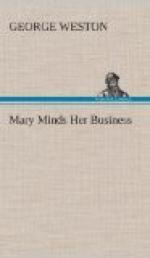The climax came at the end of the dessert. A shy girl entered, a small leather box in her hand.
“I have a souvenir for your visitor, Miss Spencer,” she said, and turning to him she added, “We made it with our own hands, thinking you might like to use it as a paper weight—as a reminder of what women can do.”
The box was lined with blue velvet and contained a small model of the Spencer bearing, made of gold, perfect to the last ball and the last roller. The visitor examined it with admiration—every eye in the dining room (which could be brought to bear) watching him through the glass partition.
“If I ever received a more interesting souvenir,” he said, “I fail to recall it. Thank you, and please thank the others for me. Tell them how very much I appreciate it, and tell them, too, if you will, that here in this factory today I have had my outlook on life widened to an extent which I had thought impossible. For that, too, I thank you.”
Of course they couldn’t hear him in the main room, but they could see when he had finished speaking. They clapped their hands; the band played; and when he arose and bowed, they clapped and played louder than before. And a few minutes later when the party left the dining room to the strains of El Capitan, it seemed to Mary that after the closing chord she heard two vigorous beats of the drum—soul expression of Mrs. Kelly, signifying “That’s us!”
The visitors departed at last, and Mary returned to her office to find other callers awaiting her.
The first was Helen, togged to the nines.
“Somehow she heard they were here,” thought Mary, “and she came down thinking to meet them. She thought surely I would bring them in here again.” But her next reflection made her frown a little. “—Partly that, I guess,” she thought, “and partly to see Burdon, as usual.”
A knock on the door interrupted her, and Joe entered, bearing two cards.
“These gentlemen have been waiting since noon,” he announced, “but they said they didn’t mind waiting when I told them who was with you.”
The cards bore the name of a firm of public accountants.
“Oh, yes,” said Mary. “Show them in, please, Joe. And ask Mr. Burdon if I can see him for a few minutes.”
If you had been there, you might have noticed a change pass over Helen. A moment before Burdon’s name was mentioned she was sitting relaxed and rather dispirited, as you sometimes see a yacht becalmed, riding the water without life or interest. But as soon as it appeared that Burdon was about to enter, a breeze suddenly seemed to fill Helen’s sails. Her beauty, passive before, became active. Her bunting fluttered. Her flags began to fly.
The door opened, but Helen’s smiling glance was disappointed. The two auditors entered.
One was grey, the other was young; but each had the same pale, incurious air of detachment. They reminded Mary of two astronomy professors of her college days, two men who had just such an air of detachment, who always seemed to be out of their element in the daylight, always waiting for the night to come to resume the study of their beloved stars.




